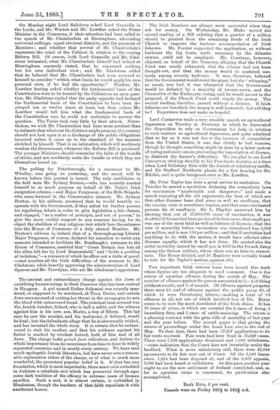On Monday night Lord Salisbury asked Lord Granville in the
Lords, and Mr. Warton and Mr. Lowther asked the Prime Minister in the Commons, if their attention had been called to the speech of Mr. Chamberlain at Birmingham, advocating 'universal suffrage, equal electoral districts, and the payment of Members ; and whether that avowal of Mr. Chamberlain's 'represents the mind of the Cabinet in relation to the coming Reform Bill. Of course, both Lord Granville and Mr. Glad- stone intimated, what Mr. Chamberlain himself had indeed at Birmingham expressly stated, that he expressed nothing but his own individual view ; and Mr. Gladstone added that he believed that Mr. Chamberlain had even reserved to himself to consider "within what limits he would apply his own personal view, if he had the opportunity." Further, Mr. Lowther having asked whether the fundamental basis of the Constitution were to be treated by the Cabinet as an open ques- tion, Mr. Gladstone replied that the party opposite had declared the fundamental basis of the Constitution to have been de- stroyed ten or twelve times at least, but that, unless Mr. Lowther would tell him what the fundamental basis of the Constitution was, he could not undertake to answer the -question. The Tories took very little by their attack. Never- theless, we wish Mr. Chamberlain had been more prudent than ,to intimate that whatever the Cabinet might propose, the country should not look upon it as a discharge of the public obligations incurred unless it came up to the standard of the measure -sketched by himself. That is an intimation which will needlessly weaken the Government, whenever the Reform Bill is produced. The younger Ministers should remember the fable of the bundle .of sticks, and not needlessly untie the bundle in which they are themselves bound up.


































 Previous page
Previous page